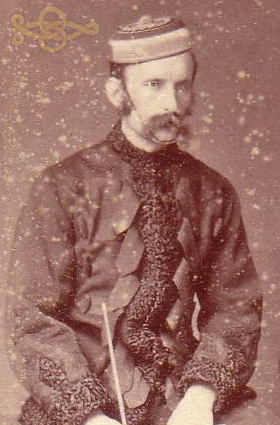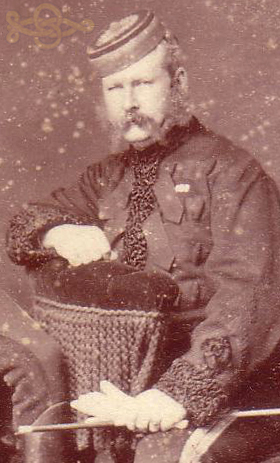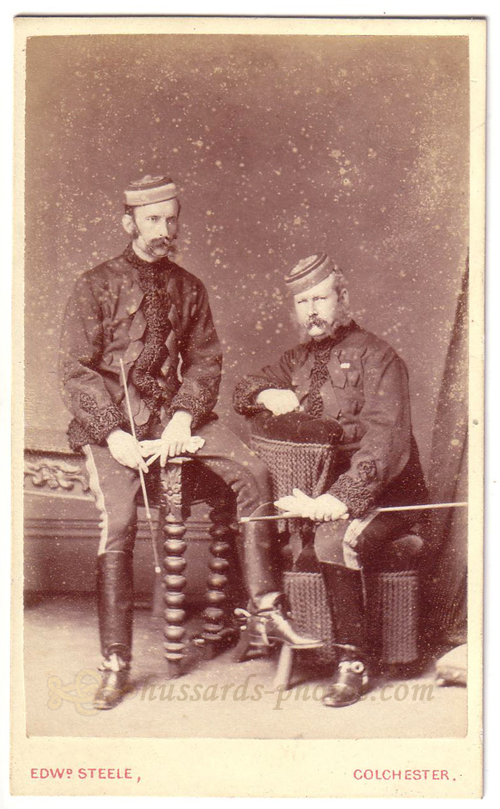|
Carte-de-Visite,
studio Edward Steele, Colchester
Captain Bird and Major Alexander, 20th Hussars |
|
| The 20th Hussars had been stationned in
India since their 1862 raising from the late 2nd Bengal European
Cavalry Regiment.
The Regiment was recalled to England in
1872, landing at Portsmouth on December 19th, as told the next day
by the Times :
"(...) Her Majesty's screw troop relief
steamship Jumna, Capt. Richards, arrived at Spithead, from Bombay,
Suez, and Malta, during Wednesday nighr, and yesterday steamed
into Portsmouth harbour to a berth alongside the great transport
jetty of the dockyard, where she will disembark the troops she has
brought home early this morning. The Jumna sailed from Bombay
Nov.15, Suez Nov.28, and Port Said, Nov.30. Malta was reached on
December 5, and left on the 6th. Very heavy weather - a continued
succession of fierce gales - has been experienced by the Jumna
since leaving Malta, and on the 15th, in a tremendous burst of
weather from the N.W. to W., the vessel was hove to for several
hours. The deaths on board since leaving Bombay have been only one
invalided soldier and three children. The officers and troops
brought home comprise:- (...) Major Cotton, Major
R.Alexander, Capts.
Heath, Lockwood, Walford, and Bird
; Assist.-Surg. W.Ffolliett
; Riding-Master Willis (and lady) ; Lieuts. Budd, Baily, Lloyd,
Perkins (lady and four children), 309 men, 22 soldier' wives, and
34 children, 20th Hussars. (...)"
The regiment reached Colchester by
special train on December 23rd, at 4 P.M.
The Times tells that "the bands of the 10th Hussars
and 50th Foot were present to play them to their barracks. The
regiment looked very well, and not at all as if they had just
landed from India".
Such courtesy would soon be repaid (The Times, Saturday,
January 11th) :
"(...) The officers of the 10th Hussars dined with the
officers of the 20th Hussars at Colchester on the 8th inst., the
evening before their departure for India. The following officers
were present :-10th Hussars- Major the Hon.C.Molyneux, Capts.Wood
and Bulkeley ; Lieuts Watkins, the Hon.C.Wood, the Hon.H.Crishton,
and Montrevor ; Lieut.-Col.Montgomery. 20th Hussars-Major
Alexander, Capts.Montgomerie, Heath, Lockwood, Trench, Walford,
and Bird ; Lieuts. Blake, Perkin, Hemans, and Browne. The 10th
Hussars left Colchester by special train at 8 30 a.m. on the 9th
inst. for Portsmouth. (...)"
The 20th Hussars would not stay long in
those barracks, being removed from Colchester to Aldershott by
early August 1873.
|
|

|
Captain John Dent Bird
John Dent Bird was born on May 4th, 1842.
A Indian Army Cadet, he became a Cornet in the Madras Army on
August 20th, 1859, and was promoted to Lieutenant one year later. On
September 30th, 1862, he was gazetted into the 20th Hussars, on
the formation of that regiment, "from General List, Madras
Cavalry". He married
Katherine-Aline-Theodosia Shortt on July 4th, 1868. Their son
Wilkinson was born on May 4th 1869. Katherine would die a mere few
months later, on August 1st, aged 25. John
Dent Bird was promoted to the rank of Captain on August 2nd, 1871. As
seen before, he came back from India with the regiment in December
1872. The next year, he was presented to the Duke of Edimburgh at
the Levée held at St.James's Palace, on May 26th. In
1874, he went through a course of garrison instruction and "voluntarily
went up to the Special Army Examination held in June" and
obtained a first-class certificate.
|
His career and life came to an abrupt end on September
12th, 1874 (from The Times, September 14th) :
"MURDER OF AN OFFICER.
Captain John Dent Bird, 20th Hussars, was shot by a man of his own troop, named
Thomas Smith, at Aldershott, on Saturday morning; It appears that the men of
"D" troop, which Captain Bird commanded, are at present engaged in
going through their annual course of musketry instruction at the Camp at
Aldershott, where the regiment is stationned. About 6 o'clock on Saturday
morning the squad to which Private Smith belongs proceeded from the West Cavalry
Barracks to the rifle ranges in the vicinity of the Royal Pavilion, for the
purpose of firing a certain number of rounds of ball cartridge at various
ranges. The party arrived at the firing ground about 9 30, under the command of
Captain Bird, and at once commenced practice at the 250 yards range, where they
fired five rounds per man. As soon as the firing had been completed at this
distance the squad was marched back to the 300 yards range, for the purpose of
firing another five rounds. Having halted a few paces behind the mark indicating
the distance, Captain Bird stood on one of the flanks as the firing was about to
commence. Private Smith was at the same moment noticed to move on one side.
Immediately afterwards he brought his carbine to the "ready position"
and shot Captain Bird through the body, the bullet entering under the right
shoulder and passing out close by the left breast. Captain Bird fell to the
ground and died almost immediately. The murderer was at once arrested, conveyed
to the regimental guard room, and placed in close confinement. When the
unfortunate officer was seen to fall it was at first thought that he had fainted,
but, in reply to a question as to what was the matter with him, he pointed to
his breast. The sergeant who had charge of the party having perceived that his
captain had been shot, said to his men "Who did that ?" when Smith
replied "I done it," at the same time throwing down his carbine and
taking off his belt and pouch. The deceased was conveyed to the barracks on a
stretcher. The sad occurrence has cast a gloom over the whole regiment. Captain
Bird, who was a most courteous and amiable gentleman, was hghly esteemed by his
brother officers. He entered the army as cornet in 1859, was promoted lieutenant
in 1860, and captain in 1871. He was a widower, with one child, a boy, who is at
present at school in Germany. The prisoner has been about 16 years in the army.
He had formerly served with the 8th Hussars. He is a man of bad character. While
serving in India some few years ago he was tried by a court-martial for
threatening to shoot his troop sergeant-major, for which offence he was
sentenced to a long term of imprisonment. About 1 o'clock on Saturday the
prisoner was handed over to the civil authorities, and taken by two of the Hants
Constabulary to the Aldershott Police-station. On the previous day, while at
target practice, he fell out of the ranks of his squad without permission to do
so,a nd for this breach of discipline was sentenced by the deceased to seven
days' confinement to barracks. An inquest will probably be held to day."
Captain Bird was interred in the Aldershott Military
Cemetary with full honours on September 15th.
An honour firing party of 100 men of the 20th Hussars was commanded by Captain
Onslow.
Private Smith was tried at the Central Criminal Court
on October 28th. Found guilty by the jury, "his life would be forfeited",
and he was "taken to the County Goal of Winchester (...) there to suffer
the extreme penalty of the law".
|
|

|
Major Robert Alexander
Robert Alexander was the son of
Lieutenant Richard Alexander, "a man of singular piety and
excellence (and) a Lieutenant in the Royal Engineers, who died at
an early age at Penzance, Cornwall" and Francis Eliza
Charity Gayer.
Robert Alexander served in the Indian
Army.
He became a Cornet on December 20th, 1848, a Lieutenant on August
10th, 1850, and a Captain on November 23rd, 1856.
He served the Indian Mutiny, and was "attached
to the 7th Hussars at the siege and capture of Lucknow in March
1858 and subsequent operations in Oude (Medal with Clasp)".
He belonged to the 2nd Bengal European
Cavalry and was gazetted along many of its officers on September
30th, 1862, when the 20th Hussars was formed from that regiment.
He was promoted Major on
December 7th, 1867.
As seen before, he came back from India with the regiment in
December 1872. The next year, he was presented to the Duke of
Edimburgh at the Levée held at St.James's Palace, on May 26th.
|
|
He was in command of the Regiment (in the absence on leave
of Lieutenant-Colonel Cotton) when Captain Bird was shot.
He was given a Brevet of Lieutenant-Colonel on November
26th, 1876, and became Lieutenant-Colonel of the Regiment on June 12th, 1878,
when Brevet Colonel Cotton retired on half-pay.
Robert Alexander retired on half-pay on December 14th,
1878 - retiring on a pension on the same day.
He died in early 1902.
|
|

